How Much Does HVAC System Replacement Cost in Tucson, AZ?

May 4, 2025
TL;DR
In Tucson, replacing a full HVAC or central AC system typically costs between $3,000 and $8,000 for standard installations, with mid-range systems averaging around $6,300–$8,200. High‑efficiency or complex installs (including ductwork, electrics, or premium brands) can push total costs to $10,000–$14,000+.
Introduction
Facing an aging or malfunctioning HVAC system in Tucson? Replacing your entire HVAC or AC system is a significant investment, but when heat waves strike and repairs pile up, a fresh installation can pay off.
This guide walks you through pricing expectations, influential factors in Tucson, and tips to make the best decision for your comfort and budget.
Average Cost for System Replacement in Tucson
Local data from Tucson-based contractors and market research shows:
- Residential AC-only installations typically range from $3,000 to $7,000, with averages around $6,300–$8,200.
- Homeyou estimates HVAC replacements in Pima County range from $1,978 to $9,892, averaging about $5,300.
- Angi and national estimates place full HVAC replacements between $5,000 and $12,500, averaging around $7,500. Additional ductwork or features can raise totals to $15,000+.
What Influences the Price?
System Type & Efficiency
Higher-SEER (Seasonal Energy Efficiency Ratio) systems cost more upfront but save long term. Basic split or central systems are the least expensive, while heat pumps, variable-speed, or inverter-type mini-splits carry higher price tags.
Home Size & Capacity Needs
Larger homes require higher-tonnage systems and more labor. Load calculations from your contractor determine the correct match and help avoid under‑ or oversizing.
Ductwork Condition
If your ducts are leaky, damaged, or inadequately sized, repairs or replacement may be required. New ductwork can add $1,000–$2,700+ to installation costs.
Permits, Rebates & Regulation-Driven Cost Increases
California and federal regulations, including the 2025 EPA mandate requiring low‑GWP refrigerants, are adding costs. Labor training, safety sensors, and compliant equipment may increase system pricing by 10% or more.
Installation Quality & Contractor Type
Labor quality varies. Well-reviewed local installers may cost more than budget chains but yield better outcomes, fewer callbacks, and potentially avoid early replacement.
Additional Add-Ons
- Electrical upgrades (e.g. panel upgrades) may add $500–$10,000 for heat pump systems.
- Optional smart thermostats, zoning systems, air purifiers, or insulation improvements can raise total costs.
- Crane rental for rooftop units can add to package installations.
Estimated Pricing by Scenario
| Scenario | Scope | Estimated Cost |
|---|---|---|
| Basic central AC change-out | Equipment only (outdoor & indoor coil or furnace existing) | $3,000–$7,000 |
| Mid-range complete HVAC | Equipment + moderate SEER (13–16), minor duct tweaks | $6,000–$9,000 |
| High-efficiency or heat pump system | SEER 16–18+, smart features, some electrical upgrade | $8,000–$11,500+ |
| Complex system installs | New ductwork, electrics, condensate management, rooftop install | $10,000–$14,000+ |
When to Repair vs. Replace
Consider Replacement If:
- Your system is older than 10–15 years, nearing the end of its typical lifespan.
- Multiple major components (compressor, coil) need replacement or fail repeatedly.
- Repair cost approaches 50% or more of a new system’s price.
- Your unit uses outdated refrigerants like R‑22 no longer supported.
Consider Repair If:
- Your system is less than 10 years old and otherwise in good condition.
- The issue is isolated (capacitor, thermostat, minor coil/coil leak).
- Minor repairs cost significantly less than replacement.
Maximizing Value & Savings
- Get 2–3 quotes. Compare equipment, labor, warranties, and financing.
- Ask about rebates, Arizona utilities and federal incentives for high-efficiency heat pumps and HVAC systems are available.
- Ensure the contractor performs a Manual J load calculation and seals ducts properly.
- Request at least a 10-year parts and labor warranty.
- Book installations in spring or fall, off-season scheduling may offer lower rates.
Conclusion
Replacing your HVAC or central AC system in Tucson is a major investment. Expect to pay between $3,000 and $7,000 for basic installs, with mid-range replacements averaging around $6,300–$8,200. High-efficiency systems or complex installs can reach $10,000–$14,000+.
Ultimately, consider replacement when repair costs climb repeatedly, your system is aging, or warranties expire on critical components. Good preparation, load calculations, comparing quotes, understanding rebates, and choosing quality installers can mean better long-term comfort and savings.
FAQs
Q1: How long do HVAC systems last in a place like Tucson?
The average lifespan for a central AC system is 10–15 years, often 12‑20 with proper maintenance. Mini‑splits may last up to 20 years or more.
Q2: Can replacing just the coil or compressor extend the system?
Sometimes, replacing an evaporator coil can cost $500–$2,500 with typical values around $1,500, but improvements may still be limited if the system is old or inefficient. In many cases, a full system replacement is more cost-effective in the long run.
Q3: Are rebates or tax credits available?
Yes. Tucson and Arizona utilities often provide rebates for high-SEER and heat pump installations. Federal tax credits are available for qualifying energy-efficient equipment.
Q4: Should I upgrade my electrical panel for a new HVAC system?
If your current panel can’t handle modern systems, especially heat pumps, you may need electrical work, which can add $500 to $10,000+ depending on the complexity and age of your home.
Q5: Will HVAC costs increase due to new regulations?
Yes, new federal and state mandates such as the 2025 refrigeration rule will raise equipment and installation costs by 10% or more. Expect the transition to low‑GWP refrigerants to add hundreds per system, and technicians may require additional training and safety sensor hardware.
